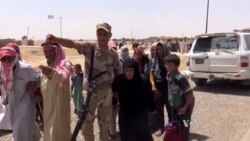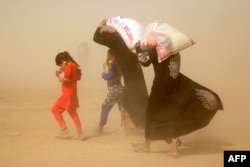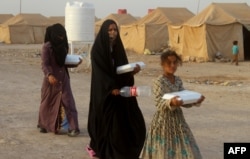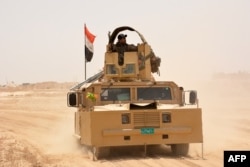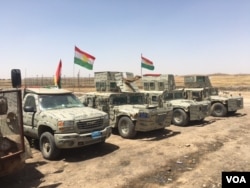Iraqi forces have liberated the city of Fallujah from Islamic State fighters, following a month-long military offensive to seize control, according to a senior Iraqi official.
Lieutenant General Abdul-Wahab al-Saadi said Sunday Fallujah is now "fully liberated" after Iraqi forces took control of the Julan neighborhood, the last area of the city still held by IS.
The destruction of the city is extensive.
Backed by U.S.-led coalition airstrikes and a strong contingent of Shi’ite militias, Iraqi forces fought fiercely for weeks to oust the extremist fighters. There are no clear reports of how many IS militants and how many Iraqi security forces died or were wounded in the battle for the city.
Tens of thousands need aid
Afraid of dying in the crossfire, 85,000 people have flooded out of the city and surrounding areas, overwhelming humanitarian agencies and Iraqi government efforts to help them. Many of the displaced are without adequate shelter, living under searing summer temperatures of 45 degrees or higher and punishing sandstorms.
“With every day that passes in the camps, the conditions for some of the most vulnerable keep deteriorating,” warned NRC’s Iraq Country Director Nasr Muflahi.
The director of a health center in Amariyat al-Fallujah, where many of the displaced ran to, warned of the lack of water and sanitation.
“We have too many people, with very few latrines, and there are no more spaces in the camps. Every five meters you find a family,” said director Ahmed Basel. “If this crisis is not tackled we will soon see diseases spreading."
Situation unstable
But despite the dire conditions in the camps, Muflahi cautioned against having civilians return to their homes too soon.
“We just do not know which areas are safe and which aren’t; we need a thorough demining of civilian areas and safety assessments,” he said in a statement released Sunday.
Many of the displaced are women and children. All males over the age of 14 were separated from their families upon leaving Fallujah to undergo security screening to make sure they were not IS members. Those released are given special badges to identify them. The screening procedure is supposed to be conducted solely by Iraqi Security Forces.
But the UNHCR said Sunday that roughly 850 men and boys from the traditionally Sunni city have been held since June 3 by paramilitary groups, a term indicating Shi’ite militia forces.
“Interviews with families confirmed reports indicating that almost all families are missing multiple family members,” UNHCR said.
Many analysts have warned of the risks of sectarian violence by the Shi’ite militias upon Fallujah’s Sunni population.
Iraqi Prime Minster Haider al-Abadi on Friday had already declared victory over the IS militants. "Daesh will be defeated," he announced, using the Arabic acronym for IS.
Mosul next
The next step, Abadi said, would be to retake Mosul.
For several weeks, U.S. intelligence officials have described the IS group as being "at its weakest point since its rapid expansion."
U.S. President Barack Obama said during a recent news conference the group is "under more pressure than ever" and that IS has been losing it key leaders.
But Iraqi Kurdish military commanders warn that Mosul, Iraq’s second largest city, will be a much tougher fight that will require a political-military agreement between all the parties involved. Kurdish commanders, for example, have warned against allowing Shi’ite militias participate in the offensive in the predominantly Sunni area.
Humanitarian agencies are already worried of the possibility of having some 600,000 Mosul-area civilians displaced, a disaster many times the size of the current desperate situation outside Fallujah.
The UNHCR is already working to build a camp to house some 6,000 future displaced on land donated by the Governor of Irbil. But it is a drop in the bucket, and nearby camps of those fleeing the ongoing fighting outside Mosul are already full.
The UNHCR overall appeal for $584 million to deal with Iraq’s 3.3 million displaced since 2014 by the war against Islamic State, is less 21 percent funded.




